FAFSA Guide
Need help with your FAFSA application? Contact Financial Aid for one-on-one assistance!
- 2024-2025 Financial Aid: If you plan to attend HCC during Fall 2024, Spring 2025 and/or Summer 2025, you need to fill out the 2024–25 FAFSA form using 2022 tax info. The 24-25 FAFSA is open until June 30, 2025. Students are encouraged to apply early to take advantage of more aid.
- 2025-2026 Financial Aid: If you plan to attend HCC during Fall 2025, Spring 2026 and/or Summer 2026, you need to fill out the 2025–26 FAFSA form using 2023 tax info. The 25-26 FAFSA is open until June 30, 2026. Students are encouraged to apply early to take advantage of more aid.
25-26 FAFSA
25-26 FAFSA Application Open
The 25-26 Free Application for Federal Student Aid (FAFSA) is now available. Students planning to enroll at HCC (part-time or full-time) for Fall 2025, Spring 2026, and Summer 2026 should file the 25-26 FAFSA after submission of an (HCC) admissions application.
By submitting a financial aid application, you may qualify for a combination of over 10 types of aid. Filling out a FAFSA is the first step to learn your options to pay with grants, loans, institutional scholarships, and work-study funds you could be eligible to receive.
How to Complete Your 2025-2026 FAFSA
Visit, hccs.financialaidtv.com/ to get step by step instructions on how to fill out a FAFSA.
- Visit gov to create an FSA ID. With an FSA ID you can apply and sign your FAFSA online.
- If you are selected for verification, turn in documentation that your financial aid office needs for completion.
- Complete the FAFSA and submit as soon as possible. The earlier you apply the better your chances to receive aid. Apply online at gov using a computer.
What you will Need to get Started?
- Email address or mobile phone number
- FSA ID for the student and the dependent student’s parent
- HCC’s school code (010422)
- Student social security number
- 2023 federal income tax returns, W-2’s, and other records of money earned
- Records of untaxed income (if applicable)
- Financial information for contributors
24-25 FAFSA
The FAFSA for the 2024-25 Academic Year Is Changing
Due to the passing of the Free Application for Federal Student Aid (FAFSA) Simplification Act on December 27, 2020, as a part of the Consolidated Appropriations Act, the FAFSA is changing for the 2024-2025 aid year.
Why is it changing?
- Allows the U.S. Department of Education to automatically obtain federal tax information from the IRS for students, parents, and other contributors (such as a spouse or stepparent).
- Reduces the number of questions students will have to answer on the form.
- Expands the Federal Pell Grant to more students and will link eligibility to family size and the federal poverty level (starting with the 2024-25 award year).
- Updates language associated with Cost of Attendance (COA).
- Provides additional flexibility for assisting students with unusual circumstances
To read more about the FAFSA Simplification Act and the changes this brings, please visit the Federal Student Aid website.
What Changes Can I Expect?
- The FAFSA application process will be streamlined and easier for students to complete.
- New terminology will be added to the FAFSA.
- The FAFSA will feature fewer questions, and requirements, and retrieve tax information using a direct data exchange from the IRS to the U.S. Department of Education instead of the previous IRS Data Retrieval Tool.
- The need analysis formula to determine financial aid, formally known as the Expected Family Contribution (EFC), will now be referred to as the Student Aid Index (SAI). The new formula removes the number of family members in college from the calculation, better reflects the FAFSA results, and implements separate eligibility determination criteria for Federal Pell Grants.
- The FAFSA is introducing the new term “contributor”, which refers to anyone who is required to provide information on a student’s FAFSA form, including the student, the student’s spouse, a biological or adopted parent, or the parent’s spouse. Being a contributor does not imply responsibility for the student's college costs.
Steps to Correct or Update Your 24-25 FAFSA Application
Most of the questions on the Free Application for Federal Student Aid (FAFSA®) form want to know your situation as of the day you sign the application. However, there are some instances in which you’ll want to (or be required to) change the information you reported after it has been processed.
- STEP ONE: To make changes or corrections to your completed FAFSA form, log in to your StudentAid.gov account using your FSA ID and password.
- STEP TWO: Determine the type of correction/change needed by reviewing the options in the “WHAT KIND OF CORRECTIONS/CHANGES CAN I MAKE?” Section below.
- STEP THREE: Once your correction/change has been made, on the “Review Changes” page and you have confirmed that your correction/change has been made, select “Continue” to sign and submit your section of the correction. Note: If a missing signature is your only error, you’ll be taken directly to this page. If your section of the form has other errors, you’ll be taken to the first page that needs additional information and will reach the “Review Changes” page once you’ve fixed all issues.
Additional Notes:
- If you’re a dependent student and you change information has or needs to be added or changed about your parent(s), your parent(s) must provide consent and/or sign your FAFSA form electronically using their own StudentAid.gov account.
- If you received a paper FAFSA Submission Summary by mail, you can make your changes, sign it, and send it to the address listed on your FAFSA Submission Summary.
- Federal tax information transferred directly from the IRS cannot be changed on your online FAFSA form.
WHAT KIND OF CORRECTIONS/CHANGES CAN I MAKE?
CHANGE ANSWER TO “DIRECT UNSUBSIDIZED LOAN ONLY" QUESTION
- Select your FAFSA submission from the “My Activity” section of your account Dashboard, then select “Start Your Correction” from under the “Student Actions Needed” section.
- Select “Continue” on the “Correct Your FAFSA® Form” page.
- Select “Start Student Section” on the “Error Summary” page.
- Navigate through the Personal Circumstances section until you reach the “Your Dependency Status” page. You’ll see that “Yes” is selected as the answer to the Direct Unsubsidized Loan Only question. Change this answer to this question to “No” then select “Continue” to navigate through the rest of the form and invite your parent(s) to complete their section of the FAFSA.
- Proceed to STEP THREE above.
ADD A MISSING SIGNATURE
- Select your FAFSA submission from the “My Activity” section of your account Dashboard, then you will see a submission details page. Under “FAFSA® Form Processed,” select “Provide Signature.”
- On the “Correct Your FAFSA® Form” page, select “Provide Signature.”
- Proceed to STEP THREE above.
CORRECTING A MISTAKE
- Select your FAFSA submission from the “My Activity” section of your account Dashboard, then select “Make a Correction” from under the “FAFSA Form Answers” section.
- Make your desired change.
- Proceed to STEP THREE above.
24-25 FAFSA Corrections – Adding a Missing Signature
All required contributors (you, your parent[s], your spouse) must provide a signature on your 2024–25 FAFSA form. If your form is missing one or more required signatures, it isn’t complete, and you won’t be eligible for federal student aid.
Once your form is processed, you and your contributor(s) can follow the steps below to add a missing signature.
Note: The images included in these instructions show a parent’s view of the form. However, the steps for adding a signature to the form are the same for students and parents.
- STEP ONE: Log in to StudentAid.gov and select the FAFSA submission from the “My Activity” section of your account Dashboard. You’ll then see a submission details page. Under “FAFSA® Form Processed,” select “Provide Signature.”
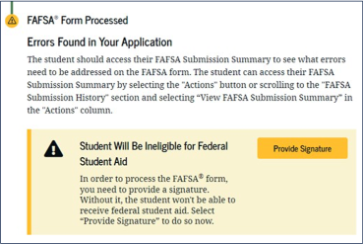
- STEP TWO: On the “Correct Your FAFSA® Form” page, select “Provide Signature.”
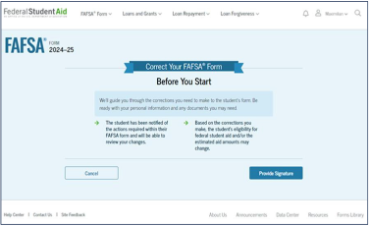
- STEP 3: On the “Review Changes” page, select “Continue.”
Note: If a missing signature is your only error, you’ll be taken directly to this page. If your section of the form has other errors, you’ll be taken to the first page that needs additional information and will reach the “Review Changes” page once you’ve fixed all issues.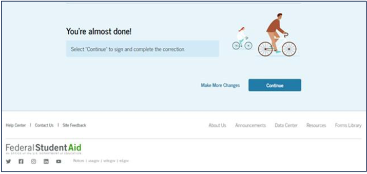
- STEP FOUR: On the “Signature” page, select “Sign and Submit.”
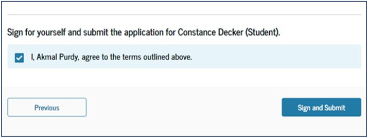
- STEP FIVE: After selecting “Sign and Submit,” you’ll be taken to a page that confirms the FAFSA form is complete.
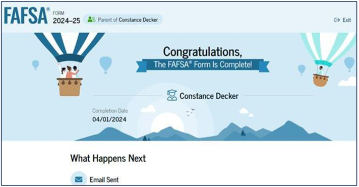
24-25 FAFSA Corrections – Updating Direct Unsubsidized Loan Only Question
On the 2024–25 FAFSA form, dependent students have the option to indicate that their parents are unwilling to provide their information and therefore want to apply for only a Direct Unsubsidized Loan. However, if a dependent student doesn’t provide parent information, their eligibility for other types of federal student aid can’t be calculated. This means they won’t be eligible for a Federal Pell Grant, Federal Work-Study, or a Direct Subsidized Loan. If you selected to apply for only a Direct Unsubsidized Loan by mistake, follow the steps below to change your answer to this question and invite your parent(s) to your form.
- STEP ONE: Log in to StudentAid.gov and select your FAFSA submission from the “My Activity” section of your account Dashboard. You’ll then see your submission details, including your form’s status. Select “Start Your Correction” from under the “Student Actions Needed” section.
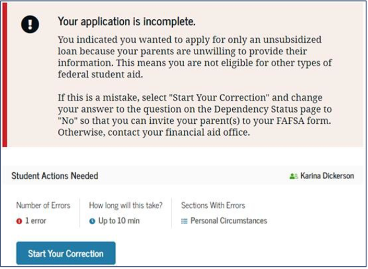
- STEP TWO: Select “Continue” on the “Correct Your FAFSA® Form” page.
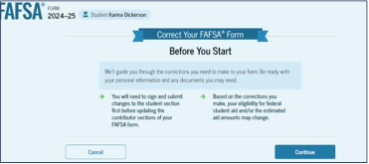
- STEP THREE: Select “Start Student Section” on the “Error Summary” page.
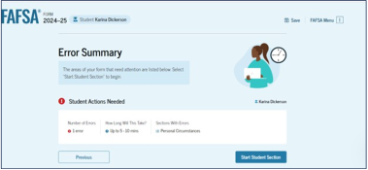
- STEP FOUR: Navigate through the Personal Circumstances section until you reach the “Your Dependency Status” page. You’ll see that “Yes” is selected as the answer to the “Direct Unsubsidized Loan Only” question.
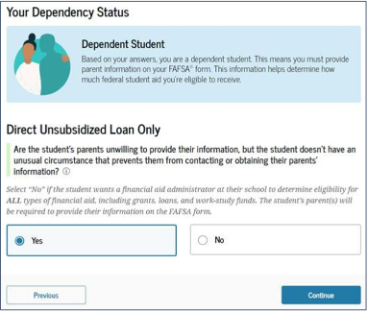
- STEP FIVE: Change your answer to the “Direct Unsubsidized Loan Only” question to “No.” Then, select “Continue” to navigate through the rest of the form and invite your parent(s).
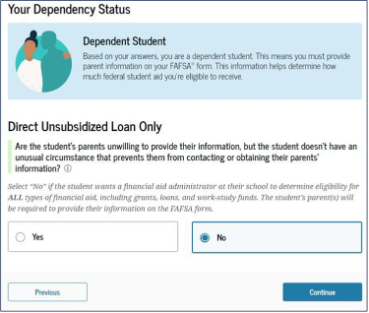
- STEP SIX: When you reach the “Review Changes” page, confirm that your answer to the “Direct Unsubsidized Loan Only” question has been changed to “No.” Then, select “Continue” to sign and submit your section of the correction.
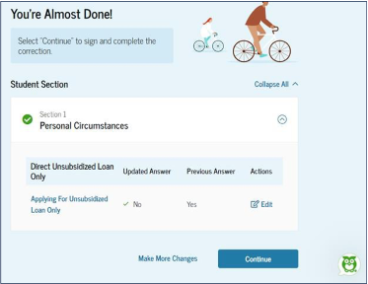
- STEP SEVEN: Review the next steps included on the “Section Complete” page. To complete your form, your parent(s) must log in, complete their section, provide their consent and approval and signature, and submit the correction.
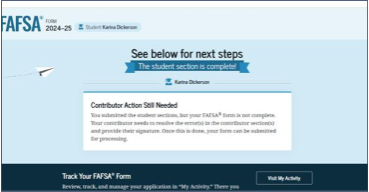
How to complete your FAFSA
How to complete your FAFSA
- Visit fafsa.gov to create an FSA ID. With an FSA ID you can apply and sign your FAFSA online.
- Complete the FAFSA and submit as soon as possible starting on December 1. Click here to apply online.
- If you are selected for verification, turn in documentation that your financial aid office needs for completion.
- Review your Student Aid Report (SAR) to find out your SAI. Make corrections and resubmit if needed.
What you will need:
- Email address or mobile phone number
- FSA ID for the student and the dependent student’s parent/stepparent
- Student social security number
- Alien registration number (if not a U.S. citizen)
- 2022 federal income tax returns, W-2’s, and other records of money earned
- Bank statements and records of investments (if applicable)
- Records of untaxed income (if applicable)
- Parents’ date of birth, social security number, marital status, date parent was married, divorced, or widowed.
Federal Student Aid ID
Use your FSA ID to confirm your identity when you access your financial aid information and electronically sign your federal student aid documents, including the FAFSA.
- Visit fsaid.gov
- Create an account by entering your email address, then creating a username and password.
- Enter your name, birth date, social security number, contact information, and challenge questions and answers. You will be required to choose two challenge questions on your own, make sure these answers are things that will not change. Example: a parent’s middle name, high school name or mascot, or your city of birth.
- Confirm your mobile phone number by using the secure code, which will be texted to the number you provided.
- Confirm your email address using the secure code, which will be sent to the email address you entered when you created your FSA ID.
Note: Keep track of your FSA ID and user information. You will use it frequently throughout the federal student aid application process each year. And every year you want financial aid during your college career.
Dependent or Independent?
Are you dependent or independent?
If you answer “yes” to any question below, you are considered an independent student.
- Were you born before January 1, 2001?
- As of today, are you married? (Answer, “yes” if you are separated but not divorced)
- At the beginning of the 2024-2025 school year, will you be working on a master’s or doctoral program (MA, MBA, MD, JD, PhD, EdD, or graduate certificate, etc.)?
- Are you currently serving on active duty in the U.S. Armed Forces for purposes other than training?
- Are you a veteran of the U.S. Armed Forces?
- Do you have children or other people (excluding your spouse) who live with you and who receive more than half of their support from you now and between July 1, 2024, and June 30, 2025?
- At any time since you turned age 13 were both of your parents deceased, or were you in foster care, or were you a dependent of ward of the court?
- As determined by a court in your state of legal residence, are you now or were you, upon reaching the age majority, an emancipated minor (released from control by your parent or guardian)?
- As determined by a court in your legal state of residence, are you now or were you, upon reaching the age of majority, in legal guardianship (of someone other than your parent or stepparent)? Note: Custody is different from guardianship
- At any time on or after July 1, 2023, did any of the following determine that you were an unaccompanied youth who was homeless or were self-supporting and at risk of being homeless?
- your high school of school district homeless liaison;
- the director of emergency shelter or transitional housing program funded by the U.S. Department of Housing and Urban Development;
- the director of a runaway or homeless youth basic center;
- or transitional living program or a college financial aid administrator
Students Experiencing Homelessness
Dependent students experiencing homelessness:
Students under the age of 24: If you are experiencing any of the below circumstances request a Homeless Youth Form from HCC in order to file your FAFSA, or if you have already filed, to be considered for more financial aid.
Experiencing unaccompanied homelessness, meaning you are not in the physical custody of your parent or guardian and lack fixed, regular, or adequate housing can include:
- Staying with other people temporarily because you lost your housing
- In a shelter
- In a motel/hotel due to lack of alternatives
- In a care or other unsheltered situation
Independent students experiencing homelessness:
Students 24 and older are considered independent, in regard to FAFSA applications, those students experiencing homelessness are encouraged to meet with a Financial Coach to determine eligibility for special circumstances.
Filing your FAFSA as a homeless youth:
If you meet all of the criteria above, you are considered an independent student for the FAFSA, because you meet the definition of an unaccompanied homeless youth. To complete your FAFSA, you will need a to make an appointment with an HCC Financial Coach and request a Homeless Youth Form.
Did you already file a FAFSA?
Students who already filed a FAFSA application and did not file as a homeless youth (who are experiencing homelessness), should make an appointment with a Financial Coach and request a Homeless Youth Form in order to be considered for aid under special circumstances.
Why meet with a Financial Coach?
An HCC Financial Coach will meet with you (virtually), one-on-one, to determine what type of homelessness you are experiencing and work with you to develop a plan on next steps and available resources. You will be required to sign the Homeless Youth Form, so that financial aid can work on getting you aid for school. Students only have to complete this process once while they attend HCC for consecutive semesters.
Click here to make an appointment with a Financial Coach.
Whose information do I use?
The intent of the FAFSA is to get an idea of your household income. If (using the previous section) you determined that you are dependent, use this guide to figure out which parent’s information to include.
Note: the following people are not considered parents unless they have legally adopted you: Widowed stepparents, grandparents, foster parents, legal guardians, older siblings, aunts, or uncles.
- Are your parents married to each other?
- If yes, then report both parents’ information on the FAFSA.
- Do your parents live together?
- If yes, then report both parents’ information on the FAFSA, even if they were never married, are divorced, or are separated.
- Did you live with one parent more than the other over the past 12 months?
- If yes, then report information on the FAFSA for the parent you lived with more. Also, if this parent remarried, you would need to report information for your stepparent on the FAFSA even though he or she may not be responsible for your college costs.
- If no, then report information on the FAFSA for the parent who provided more financial support over the past 12 months or in the last year you received support. Also, if this parent is remarried, you will need to report information for your stepparent on the FAFSA.
- Are you married?
- If yes, report your spouse’s income.
- Are you 24 years or older?
- Use only your income unless you are married.
Helpful Hints
Assets
- Asset net worth means current value of the assets minus what is owed on those assets.
- Assets include: money in cash, savings, and checking accounts; businesses (over 100 employees); investment farms; other investments, such as real estate (other than the home in which you live); UGMA and UTMA accounts for which you are the owner; stocks; bonds, certificates of deposit, etc.
- Assets do not include: the home and farm where you live; UGMA and UTMA accounts for which you are the custodian but not the owner; value of life insurance; retirement plans (401[k] plans, pension funds, annuities, non-education IRA’s, Keogh plans, etc.)
Communication
Please be advised that Financial Aid will be communicating with students exclusively through HCC email addresses. Financial Aid recommends students use their HCC email address on their FAFSA applications. Students who have not been assigned an HCC email will receive communications to their personal email account until their school email address has been created by HCC. Students are encouraged to monitor their HCC email accounts closely to ensure they don’t miss any important information regarding financial aid.
Data Security
- Each email address or mobile phone number can be used with only one FSA ID. If you share an email address with someone else, then only one of you will be able to use that email address to create an FSA ID. This applies to your mobile phone number too.
- Keep track of all usernames and passwords in a safe, secure place. You will need your FSA IS every year your complete a FAFSA, as well as to log in to all Department of Education websites.
First Year College Students:
- The grade level for high school seniors and first-year students will be “Never attended college and 1st year undergraduate” even if you have taken AP or dual credit courses.
- The question, “What degree or certificate will you be working on when you begin the 2021-2022 school year?” refers to the category of type of program and NOT college major. Refrain from choosing “Other/undecided.” First-year college students will not be in a graduate program.
Important Information
- Name and social security number needs to match what is on your social security card and tax forms, if applicable.
- Tax filers should use the IRS Data Retrieval Tool to transfer income information from the IRS to the FASFA if possible (both student and parent).
- Review the confirmation page and check your email as an indicator the FASFA was submitted correctly.
Website Navigation
- To get clarification and guidance for each data field, click on the question mark next to each data box to show HELP text.
- The top of the screen will indicate whose information is needed on that page, either student or parent. When the FAFSA says, “you,” it is referring to the student (not the parent).
- Make sure that you select the correct form. High school seniors graduating in 2023 will need to complete the 2024-2025 FAFSA.
- Your FAFSA will reset after 45 days if it isn’t submitted.
One-on-One Help When Completing Your FAFSA
If you need one-on-one assistance with completing your FAFSA, please feel free to visit one of Houston Community College’s financial aid offices. A list of Financial Aid Office locations and hours are available at hccs.edu/finaidcontact.
24-25 FAFSA Guide [163 kbs]
Download this 2024-2025 FAFSA Guide PDF file for instructions on how to complete your FAFSA application.
25-26 FAFSA Guide [243 kbs]
Download this 2025-2026 FAFSA Guide PDF file for instructions on how to complete your FAFSA application.
